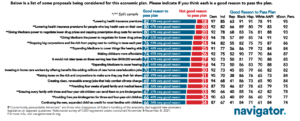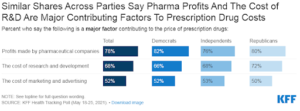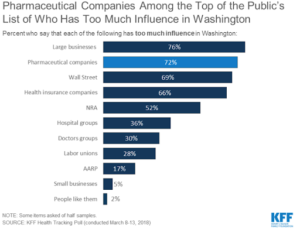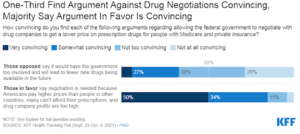Democrats in Congress reached a historic agreement to lower prescription drug prices for all Americans through the Build Back Better Act.
For 20 years, drug companies have benefited from a law that bans Medicare from negotiating lower prices for patients. As a result, Americans pay three times more for the same drugs as people do in other countries. Build Back Better will give Medicare the power to negotiate lower prices once and for all, and it will cap seniors’ out-of-pocket drug costs, stop excessive price increases for existing medications, and limit insulin copays to $35 per month for diabetics.
Even as Congress has landed on a deal, Big Pharma has continued to deploy its vast warchest – and a series of well-funded front groups – to mislead, distort and outright threaten patients in their effort to hold on to their staggering prices and profits.
Almost all of them are channeled through groups with patient-friendly names that have one thing in common: drug industry money or connections.
This updated report details how the many major ad campaigns currently running against prescription drug price reform are actually backed by pharmaceutical industry funds. The ads are paid for by the same people who profit by keeping the prices artificially high and protecting their monopoly while millions of American families cannot afford life saving medicines.
REVEALED: PHARMA’S CAMPAIGN TO STOP LOWER DRUG PRICES
Pharmaceutical Research and Manufacturers of America (PhRMA)
PhRMA Is Spending Millions Misleading The American People. In September, PhRMA launched a 7-figure ad buy against drug price negotiation proposals moving through Congress. The tPhRMA is out with twoa new advertising campaigns intended to make Americans fear Medicare drug price negotiation by claiming politicians will decide what drugs patients can get. The ad, featuring Sue — a Type 1 diabetic, made such outrageous claims about restricting patients access to needed medications, the Washington Post gave it a ‘Three Pinachios’ rating and said the ad was PhRMA’s attempt to claim “there are provisions in the legislation that do not exist.” In 2021, a CBO working paper estimated that if Medicare was empowered to negotiate drug prices, they would “fall between 57 percent and 75 percent, relative to current prices.” Factcheck.org agrees that Medicare negotiation would not prevent beneficiaries from accessing medications and PhRMA’s ads are an “inaccurate portrayal of recent legislation.”
PhRMA Cannot Be Trusted With Drug Pricing Reform. PhRMA represents the nation’s leading biopharmaceutical companies. Americans see through the fear tactics used by pharma industry trade groups, with 75 percent of Americans reporting they do not trust the industry to fairly price prescription drugs.
PhRMA Spent More Than $20 Million On Lobbying In 2021 So Far. According to OpenSecrets, PhRMA has spent $22.9 million on lobbying in 2021 so far. PhRMA is on track to break their 2019 lobbying spending record of $29.3 million this year. According to research by Patients For Affordable Drugs Now, PhRMA and its front groups have spent at least $26.5 million on television and digital ads against Medicare drug price negotiation between July and November of this year.
American Action Network (AAN)
American Action Network Is Funneling Millions Into Misinformation Campaigns. AAN is currently running a $5 million advertising campaign, claiming the recent budget resolution is “a socialist prescription drug plan that would limit patients’ access to lifesaving medications.” In reality, the resolution would allow Medicare to negotiate fair prescription drug prices, something 88 percent of Americans strongly support. In 2019, AAN received $4.5 million from PhRMA, the largest contribution made by the trade group that year.
American Action Network Has Received Millions From A Pharmaceutical Trade Group. AAN has a long history of accepting funds from the pharmaceutical industry. A year after the group’s formation, AAN took $4.5 million from PhRMA. This trend has continued, with AAN receiving nearly $15 million from PhRMA between 2016 and 2019.
Medicare Today
Medicare Today Is Not Telling The Whole Story. Medicare Today launched an advertising campaign, claiming that 92 percent of seniors are “satisfied” with Medicare. What Medicare Today failed to mention is while seniors support the program, they are also strongly in favor of improving Medicare and lowering drug costs. The majority of seniors support allowing the government to negotiate prescription drug prices (82 percent), placing a limit on out-of-pocket drug costs (68 percent), and lowering the amount Medicare pays for drugs based on amounts in other countries (60 percent).
Medicare Today Was Launched By Big Pharma Executives. Medicare Today was launched in 2004 by the Healthcare Leadership Council, a coalition of health care executives, which includes the pharmaceutical industry. Healthcare Leadership Council includes the drugmakers: Amgen, Biogen, Bristol-Myers Squibb, Johnson & Johnson, Merck, and Pfizer.
Partnership to Fight Chronic Disease
Partnership To Fight Chronic Disease Is Using Big Pharma’s Tired Scare Tactics. The Partnership To Fight Chronic Disease is running a new advertising campaign claiming drug price negotiation will stifle innovation and reduce patient access to lifesaving drugs. The CBO analyzed the impact of a decrease in pharmaceutical revenue by as much as $1 trillion and found that it would only have a modest impact on drugs coming to market (impacting approximately eight of the 300 new drugs expected in the next decade). Only 10 percent of drugs that have entered the market over the last 50 years have represented therapeutic advances, with drugmakers making deliberate choices not to invest in research and development, and instead focusing resources on obtaining patents on old drugs, in order to “extend patent protection, prolong monopoly pricing periods, and keep generic competitors off the market.”
Partnership To Fight Chronic Disease Is Funded By Big Pharma. It is no wonder why the Partnership To Fight Chronic Disease is working so hard to protect the bottom line of drugmakers — they are an affiliate of Pharmaceutical Research & Manufacturers of America, which represents biopharmaceutical corporations. Over the past 10 years, the Partnership To Fight Chronic Disease has listed PhRMA officials as key employees on tax forms and despite running multi-million ad campaigns, the organization has not reported fundraising costs since its founding in 2007.
Pharmaceutical Industry Labor-Management Association (PILMA)
PILMA Is Making False Claims That Medicare Price Negotiation Will Damage Innovation. PILMA is running an advertising campaign claiming that Medicare price negotiations would harm innovation and make it harder for patients to access their medications. This is simply not true and fails to recognize that under our current system, nearly one in three Americans report not taking a medication as prescribed due to cost. A 2017 report from the National Academies of Medicine found, “drugs that are not affordable are of little value.”
PILMA Cannot Be Trusted With Drug Pricing Reform. PILMA is a coalition of biopharmaceutical companies and labor unions. Americans recognize that Big Pharma is putting profits over people, with 80 percent of Americans reporting the pharmaceutical industry’s profits as a “major factor” for the high cost of prescription drugs.
60 Plus Association
60 Plus Association Is Fighting Medicare Price Negotiation. The CBO found Medicare drug negotiation would save patients more than $150 billion at the pharmacy counter, yet 60 Plus Association is running an advertising campaign, attempting to sell Medicare negotiation as a ‘scam’. In reality, it is 60 Plus that has been deceiving the public. In 2016, the Koch Brother affiliated organization was fined by the Federal Election Commission after violating federal rules requiring they identify the source of funds earmarked for political expenditures. 60 Plus, along with two other Koch affiliated groups, consented to pay a total of more than $200,000. The New York Times referred to the investigation as “a look…into the interlocking networks of political nonprofits on the right, through which vast sums of money flow each election cycle with little disclosure.”
In September 2021, 60 Plus released another ad campaign referring to the $500 billion saved by the government from drug price negotiation as “cuts to Medicare.” KHN and Politifact agree that this is misleading since the $500 billion would not be “swiped” by Democratic leaders, but would be used for reinvestment in Medicare hearing expansion.
60 Plus Association Has Received Millions From The Drug Industry. It is clear who has been holding the reins at 60 Plus. In 2002, 91 percent of its $12 million revenue came from a single donor, which Public Citizen presumes to be PhRMA. 60 Plus has also received money from drugmakers like Pfizer, Merck, and Wyeth-Ayerst.
One Nation
One Nation Is Burying the Lede. One Nation is running a new advertising campaign claiming “good health care is hard enough to get” and that Medicare drug price negotiation would restrict access to lifesaving drugs. What One Nation fails to mention is one of the leading limitations to health care access is the soaring cost of prescription drugs. 29 percent of Americans taking prescription drugs have reported not filling, halving, or skipping a needed prescription due to cost in the past year.
A Big Pharma Lobbyist Sits On One Nation’s Board. One Nation added Ken Cole, former lobbyist for Pfizer and Chamber of Commerce board member, to their board in 2019. Pfizer and the Chamber of Commerce have spent a collective $1 billion on lobbying over the last decade, including on efforts to kill legislation aimed at lowering the cost of prescription drug prices.
National Association Of Manufacturers
National Association Of Manufacturers Falsely Link Price Setting With Decreases In Innovation. The National Association of Manufacturers released an ad campaign in early October falsely linking Medicare price negotiation with decreases in innovation for “life-saving cures and vaccines.” The Harvard Business Review found that even though Medicare negotiation would lead to 2 fewer drugs in the next decade and 23 fewer in the following decade, price setting would not lead to decreased innovation as many of these drugs would be modified versions of already existing drugs.
PhRMA Is A Member of NAM. NAM member organizations represent a plethora of different industries like textile manufacturers, paper products, and the meat industry. PhRMA is a member of NAM and has been able to successfully air ads attacking Medicare negotiation under the NAM branding.






